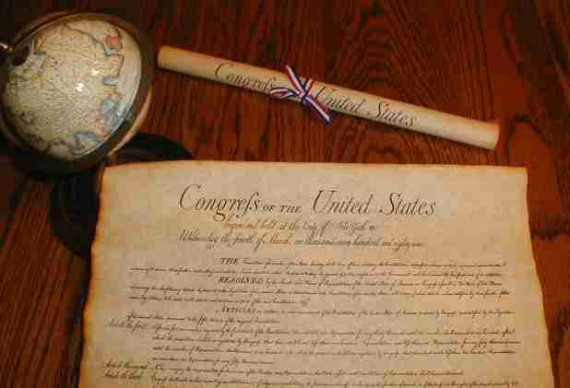Supreme Court To Decide If Politicians Can Be Sued For Lying During A Campaign
The Supreme Court is set to hear arguments next week in an important First Amendment case.
Next week the Supreme Court will hear arguments in a case challenging an Ohio law that makes it a crime to lie during the court of an election:
Groups at both ends of the ideological spectrum are challenging an Ohio law, on the books since the 1970s, that forbids candidates, issue groups or anyone else from knowingly or recklessly making false statements about someone on the ballot — whether the untruths are intended to help elect or defeat the candidate. Fifteen other states similarly criminalize “false” political statements, briefs in the case say, but this is the first constitutional challenge against one of those laws that’s made it to the Supreme Court.
The dispute started during one of the hottest House races in the country in 2010 — a rematch in a swing district covering western Cincinnati and the adjacent suburbs between freshman Democrat Steve Driehaus and the Republican he’d ousted two years before, Steve Chabot.
A group organized to elect candidates opposed to abortion, the Susan B. Anthony List, sought to rent space on a billboard declaring “Shame on Steve Driehaus! Driehaus voted FOR taxpayer-funded abortion,” but the sign’s owner called off the deal after the congressman filed a complaint with the Ohio Elections Commission alleging the message violated the false statements law.
SBA List said it was on solid ground because the congressman had voted to enact the health care overhaul, which anti-abortion groups interpret as permitting tax dollars to be spent on the procedure. Even after President Barack Obama signed an executive order saying that insurance plans sold on the new health exchanges could not spend any of their federal subsidies on the vast majority of abortions, exceptions remained in cases of rape, incest or when the pregnant woman’s life was in danger.
Driehaus, who cultivated a socially conservative record, said in his legal brief that the “defamatory meaning” of the billboard was clear: to falsely portray him as “a hypocrite who abandoned his principles and his constituents.”
He dropped his complaint after losing that fall to Chabot, who still holds the seat. But SBA List, since joined by the American Civil Liberties Union as well as some tea-party-like organizations, filed a federal lawsuit alleging the Ohio law’s threat of prosecution was an unconstitutional infringement on free speech.
(…)
The plaintiffs are hoping to bolster their cause by likening the Ohio statute to a 2005 law that made it a federal crime to lie about receiving military honors or decorations. Two years ago, the justices voted 6-3 to strike down that “Stolen Valor Act” as a violation of the First Amendment.
But as is the case so often, the court has a wide opening to decide the case without addressing the big constitutional question. It could rule only on the preliminary procedural question of whether Susan B. Anthony List may press its arguments in the lower courts because of its fears about getting in trouble in the future, or has lost standing to sue because it’s no longer threatened with prosecution over the billboard.
If the justices are looking for guidance from the state of Ohio, they are going to find it — in contradictory stereo. State Attorney General Mike DeWine has taken the extraordinary step of producing arguments on both sides of the case.
One of his briefs says the law should be left alone on the narrow standing grounds. That argument is that the anti-abortion group didn’t see its free speech rights curbed because the Driehaus complaint went away, and there is no way to prove it’s going to run afoul of the statute by reviving the Obamacare-finances-abortion line of attack this year.
The other brief says the law should be struck down on constitutional grounds. Not only does it allow “the state’s legal machinery to be used extensively by private actors to gain political advantage,” that argument says, but the law “fails to provide adequate safeguards (including prompt judicial review) against the chilling of political speech.”
I wrote about the Driehaus lawsuit in 2010 when it was first filed and then again when a Federal Judge denied a Motion for Summary Judgment seeking to dismiss the claim. As I noted in that second post, there are serious First Amendment questions at play here:
If there’s any one thing that the First Amendment was clearly intended to protect it is political speech, specifically speech regarding a candidate for election about an issue of public controversy. The idea that a candidate could turn around and file a civil action against a citizen, or in this case a group of citizens, for statements made in the heat of an election campaign is, to say the very least, extremely disturbing.
For one thing, the very act of filing a suit can have a chilling effect on other speech. If someone who wants to speak out against a candidates position on particular issue sees that doing so can lead to the possibility, or threat, of a lawsuit, they are less likely to speak out, regardless of whether or not they are right. For another, determining truth and falsehood in the context of a political argument isn’t always easy because it is so typically laden with exaggeration and hyperbole. Would Judge Black say, for example, that Paul Ryan has a cause of action against the people who say his budget plan ends Medicare, because that is clearly untrue? There are plenty of exaggerations like this strewn throughout political debates, the idea that each one of them would suddenly become subject to a defamation suit is deeply concerning. Saying that a politician raped a child when one knows that to be false is one thing, saying that the plan they favor would have a certain policy impact strikes me as being quite another.
A law that essentially criminalizes political speech and gives government officials the power to determine the truth or falsity of claims made during the course of a political campaign is one that is quite obviously fraught with danger. For one thing, it creates the possibility that such laws will be enforced based on partisan biases and that the “false” claims of one politician will be punished while those made by another are allowed to stand without punishment. As with any similar restriction on political speech, this would inevitably create a chilling effect that would reduce the amount of speech that takes place during a campaign. This, of course, would be completely antithetical to the intentions of the First Amendment, which has been described as being designed to create a marketplace of ideas wherein ever claim would be freely made, and everyone would be free to challenge those claims. The answer to a politician or a political group who makes a false claim during the course of a campaign, then, isn’t to punish them in Court but to present the evidence showing those claims are false to the public. In the end, the voters will digest all of this information and decide accordingly. More often than not, they will end up getting it basically right.
As noted, it’s possible that the Court will decide this case on procedural issues and thus avoid ruling on the First Amendment claims being raised, but I hope they don’t. If there’s any part of public life in which we should avoid restricting speech it is during the course of a political campaign, and that’s exactly what the Ohio statute does..







It would be far more appropriate if journalists simply did their jobs and called out lies of this type…the fourth estate is the proper venue for this…not the courts.
Having said that it’s pretty clear that in this case the SBA List is the one doing the lying. But as an extremist organization no one should be surprised by that.
Speaking of which, did you know that right-wing extremists have killed more Americans since 9/11 than Al-Qaeda jihadists have?
http://www.cnn.com/2014/04/14/opinion/bergen-sterman-kansas-shooting/
They can always fall back on the Costanza Defense:
“It’s not a lie… if you believe it”
There is an important moral and legal difference between free speech and outright fraud. IMO, the Ohio billboard ad was arguable, and as Cliffie notes, in any kind of functioning political system, a free and competent press would have brought the issue to the public to make their own decision about. But in the end, you have to weight one thing against another… which is the bigger injustice: putting well-defined restrictions on what can & cannot be said in a political ad, or allowing candidates to purely and deliberately lie about their opponents? I will always fall on the side of restricting an individual liberty a little in order to make society overall a better place.
This is a local case for me. I work in the District where this came up. Mostly I agree with you Doug, that the solution is potentially worse than the problem. But I hate that people like Susan B. Anthony List can just put out bald faced lies. But what do we do about it? @C. Clavin: is right that we wouldn’t have this problem if the press did their jobs. But what are the odds of that happening? And I would have to demand proof, Doug, that your favored solution has ever worked –
The real answer is an engaged, informed, thoughtful electorate. I like the odds of that happening even less than for the press doing their jobs.
@C. Clavin:
The comments on that article are…interesting.
Boy, that would really clog up the courts. I’m not sure we could afford it. @C. Clavin: I agree
As much as I hate to say it, it’s probably best if we assume they’re all lyin’ and move on.
Mr./Ms. gVOR08 writes:
” But I hate that people like Susan B. Anthony List can just put out bald faced lies.” Not seeing how voting for obamacare didn’t fund abortions.
Are you saying that obamacare, via tax credits and tax subsidies does NOT allow for the purchase of insurance plans that cover abortions?
Are you not proud and happy that obamacare (in a bit of roundabout manner) pays for abortions?
Anywho, what about politicians you favor that tell bald faced lies
https://www.youtube.com/watch?v=D7fvpjkxEVs
You should read P. J. O’Rourke’s amicus brief on this (PDF). Money quote:
Whenever the issue is free speech, the Court should err on the side of freedom.
Why is this a First Amendment issue? Is there a constitutional assumption that a politician or political group cannot speak freely without lying?
Could this not be covered under fraud or false advertising? Especially a situation like this where it is an advertisement in question? It would be illegal for GM to claim on a billboard that their new car goes 800 miles an hour or gets 1000 miles to the gallon. Why should political advertising be held to a lower standard?
I agree that the press should be calling out lies. They cannot catch al the lies though. Really what we are seeing here is equivalent to the Seahawks in football. Some of their players admit to cheating a bit on every play because the refs aren’t going to call them all. I am sure they are not the only ones.
@Pete S:
Exactly. They can claim it’s the best car, or the most fun to drive — that falls under the ‘puffery’ defense. But factual claims must be backed by facts, and GM doesn’t get to decide how factual is factual enough.
On the civil side, a politician can plausibly claim libel or slander for untruthful statements that harm that politician’s election chances. That seems like a reasonable approach in that arena.
As for criminal penalties… We have no problem convicting the moron who yells “Fire!” in a crowded theater — free speech rights do not trump public safety and reckless endangerment. Surely campaign lies also harm us all, individually and collectively, so I have no problem with there being criminal penalties for deliberate public falsehoods in those cases. Even a few convictions would have a bracing effect on public discourse.
@DrDaveT: But how many political claims are so cut and dried? In the example in this lawsuit the lawmaker technically did vote for government funded abortions. I suspect most campaign claims fall in this gray area. I agree with the above poster and say we should just assume they’re always lying (or at least shading the truth).
I think the Roberts case should resolve this the same way they do every other case about speech in elections:
If a rich person says it, it’s vital that the nation hear it.
If a poor person says it, it can be banned.
This suit, like the Common Cause suit reported here on OTB, today is complete and total bulls*** too. Honestly, it’s bad enough that there enough idiots out there who don’t know what a “lie” is. if successful, suits based on so-called “lies” during a campaign could clutter the courts for years.
1) Because we tend to give extremely broad protection to speech, especially political speech Note what the amicus briefs say about the chilling effect of this law. Several orgs backed off of attacks because they worried about being accused of a crime, even if it was just a SLAAP to shut them up until after the election.
2) Because a law like this, if written too broadly, could potentially attack satire and hyperbole;
3) Because this statute does not, in any way, bar a politician from lying about himself. A politician can say he voted for lower taxes and two chickens in every pot even if he hasn’t. So it’s purely a restraint on lies that incumbents don’t like.
4) Because often we’re not talking about a straight forward lie but a difference in opinion. I recently read a piece that claimed a politician was lying when he claimed Obamacare would increase the deficit. That’s not a lie; it’s a difference of opinion about something that has happened yet.
As far as I’m concerned, this law can’t be smacked down hard enough.
Hmmm…. I don’t know, think of the positive: Politicians would have to shut up.
@JWWJ: Why shouldn’t the federal gov’t allow funds to go for a legal, and quite often necessary, medical procedure? Please, do tell. I await your reasoning with bated breath.
@JWWJ:
If a ACA customer selects a plan with abortion coverage, they are supposed to pay a surcharge that covers the cost.
An abortion usually costs the insurer lots less than a pregnancy carried to term($500 vs $30000). Therefore, they’re going to usually make the surcharge as small as legally allowed. (The law requires it to be at least one dollar.)
@legion: The problem with your last statement is you aren’t going to be the one who decides how much individual liberty is appropriate to give up. A politician is.